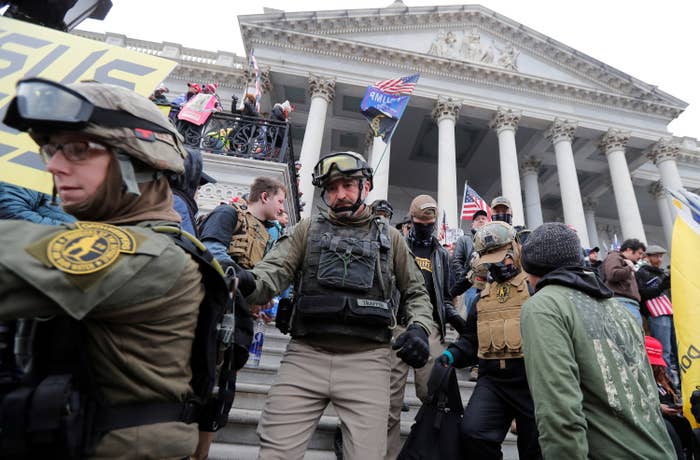
In a crucial ruling, a federal judge in Washington, DC, on Monday refused to dismiss conspiracy charges against Oath Keepers and associates of the group who stand accused of storming the Capitol on Jan. 6.
Had Judge Amit Mehta granted the defendants’ motion, the largest and most serious of the cases against the alleged insurrectionists would likely have been gutted. Instead, Mehta, after more than six months of deliberation, issued a 49-page ruling that kept the charges intact, paving the way for the 17 defendants to face trial.
As many as two dozen members and close affiliates of the armed extremist group Oath Keepers busted into the Capitol building in battle gear in a military-style “stack.”
As Mehta noted, many of them had been summoned to Washington by a message the Oath Keepers’ leader, Stuart Rhodes, had posted on Jan. 4, urging them to “stand tall in support of President Trump’s fight to defeat the enemies foreign and domestic who are attempting a coup.” Some brought weapons, which they stashed in a hotel in Virginia, in case they were needed for a “quick reaction force.” And many joined an encrypted chat on the Signal messaging app to coordinate before and during the events of the insurrection.
In the wake of the Capitol attack, prosecutors pointed to these and other actions as evidence of an organized conspiracy to disrupt an official proceeding, the certification of the Electoral College, which was among the most serious charges to come out of the sweeping Justice Department investigation.
To date, at least three Oath Keepers who coordinated with the group have taken plea deals and agreed to cooperate with the prosecution. Another Oath Keeper who appeared to be in Washington on his own also pleaded guilty. Still, another 17 members or affiliates face decades in prison if convicted on a variety of charges.
In mid-June, Thomas Caldwell, a retired Navy veteran who was not a dues-paying member of the Oath Keepers and did not enter the Capitol building but was in close contact with the group and stowed a .22 rifle at the Virginia hotel, filed the first motion to dismiss the charges.
Other defendants filed similar motions and all 17 eventually joined the fight. Essentially, they claimed that the conspiracy charges should be dropped because they were vague, and because their actions on Jan. 6 amounted to First Amendment–protected free speech. They also questioned the idea that the certification of the Electoral College amounted to an “official proceeding” of Congress, and thus, any attempt to disrupt it wouldn’t count as a crime.
In the 49-page ruling that included references to Supreme Court precedents and histories of legislation and Congressional intent, Mehta flatly disagreed.
Noting that some of the defendants “entered with bear spray and assaulted police officers,” Mehta called their arguments “inaccurate,” adding that “their alleged conduct was no mere political protest or trespass.”
After brushing aside numerous quibbles with the wording and intent of the language of the relevant criminal statutes, Mehta similarly cast aside the contention by the defendants that their activities on Jan. 6 were protected free speech. Donning paramilitary gear and supplies, barging their way past barricades and police to forcibly enter the Capitol building, and using encrypted messaging to keep their plans secret would not, he contends, be protected by the First Amendment.
Because there are so many defendants in the case, and due to the huge volume of evidence presented by the government, Mehta has said he expects to try the case in two batches. The first is scheduled to begin April 19, with a second trial, if necessary, set for July 11.

